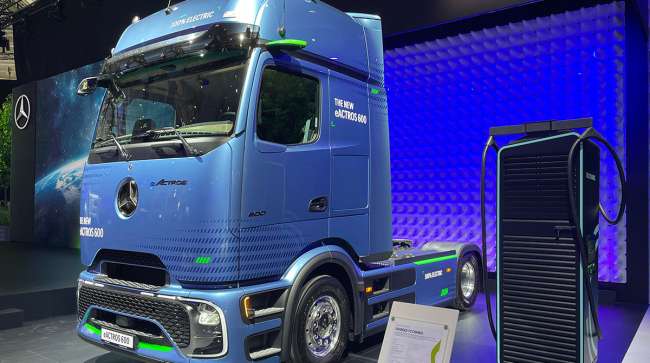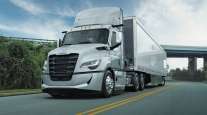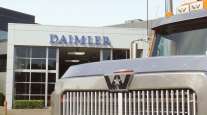Executive Editor
Daimler Broadens Global Platform of Electric Vehicles, Services

[Stay on top of transportation news: Get TTNews in your inbox.]
HANOVER, Germany — Daimler Truck introduced a dedicated brand for its global charging infrastructure initiatives and broadened the scope of its financial services business to include e-mobility offerings during the biennial IAA Transportation Conference, efforts rolled out in concert with the announced serial production launch of its global electric heavy-duty truck.
“We already presented our vision for the sustainable transportation of the future years ago,” said Daimler Truck CEO Martin Daum, who will step down from the company’s top post at the end of the month. “For us, the IAA Transportation 2024 clearly revolves around implementation of that vision. We are supplying battery-electric series vehicles in the quantities required by our customers.”
Outside of the United States, those trucks will be led by the Mercedes-Benz eActros 600 heavy-duty model, serial production of which will begin in November at the Mercedes-Benz factory in the German town of Wörth.
Daimler Truck in a Sept. 15 news release noted that its factories in Mannheim, Kassel and Gaggenau are vital to this rollout. They will supply the electric axle, transmission elements and numerous high-voltage and low-voltage components located in the space that would otherwise be occupied by an internal combustion engine.
“Our eActros 600 is a strong alternative to a diesel truck, thanks to its range of 500 kilometers [about 310 miles] on one battery charge,” said Mercedes-Benz Trucks CEO Karin Rådström, who will succeed Daum as Daimler Truck CEO on Oct. 1. “With its high energy efficiency, it will be profitable for fleet operators. Now it is imperative for governments, the energy sector and industry to act together to drive forward the expansion of public charging infrastructure.”
A pair of Re440 e-axles that will power two Mercedes-Benz eActros 600 trucks are loaded onto a trailer at the manufacturer’s factory in Kassel, Germany. pic.twitter.com/pq5pjOiBpS — Joe Howard (@JoeHoward_TT) September 18, 2024
Daimler and other manufacturers have called on governments to do more to incentivize the purchase of zero-emission vehicles, which typically are more expensive than their diesel-powered counterparts. Daimler and others also will work with their customers to help identify opportunities when electric vehicles could work well within a fleet’s operation.
RELATED: Daimler Truck North America Announces Key Leadership Changes
A next step for Daimler in that effort is the announced expansion of services in its financial services arm to include an integrated suite of electromobility offerings. Specifically, the company announce that Daimler Truck Financial Services will extend its services to include charging infrastructure, maintenance and electricity contracts. Included in this expanded suite will be insurance, payment options and rentals, Daimler said.
Some of this work already has begun. In the U.S., DTFS offers a “Charging as a Service” program, while in Japan it has made available “Green Lease” contracts for the electric medium-duty Fuso eCanter. And in Europe, DTFS provides leasing options for the eActros 300/400 and 600 that include service and repairs. Daimler said it also is developing insurance products tailored for electric vehicles and expanding its rental and payment options. DTFS has around 1,900 employees with operations in 17 countries and plans to expand.
RELATED: Daimler Truck Advances Battery-Electric Ambitions in Germany
Daimler Truck also announced the launch of its TruckCharge brand in Europe. The manufacturer said the name is meant to bring together all of its offerings relating to infrastructure and charging for electric trucks, including consulting services and the operation of electrified depots for transportation and industrial companies.
Since sales of the eActros 600 began last year, Daimler Truck has recorded 2,000 orders and has letters of intent totaling a “four-digit figure,” the company said. The first customer vehicles are due to be produced and registered before the end of this year.
Want more news? Listen to today's daily briefing above or go here for more info
Daimler noted that two near-series production prototypes of the truck completed a nearly seven-week test run across 22 European countries covering more than 15,000 kilometers, or about 9,320 miles. Each truck traveled with a 40-ton gross combined weight and used public charging stations exclusively along the trip.
Daimler also spotlighted its efforts to advance hydrogen power for heavy-duty trucks. Alongside pure-electric vehicles, Daimler said that hydrogen-based drive technologies can be a “suitable solution to decarbonize very flexible and particularly demanding applications in heavy-duty longhaul transportation.”
The company last year demonstrated the potential for a hydrogen fuel cell-powered truck by completing an approximately 650-mile run with its Mercedes-Benz GenH2 cabover model along roads in Germany. On a single hydrogen fueling, the 88,000-pound truck-and-trailer combination covered 1,047 kilometers during an overnight run along the autobahn.
TT's Seth Clevenger and Mike Senatore dive into the details behind the 2024 Top 100 Private Carriers list. Tune in above or by going to RoadSigns.ttnews.com.
A driver team departed from the company’s 10 million square-foot plant in Wörth am Rhein and arrived in the capital of Berlin. The truck was fueled with nearly 180 pounds of hydrogen, and officials with certification agency TUV Rhineland placed seals on both of the truck’s 90-gallon tanks to verify no refueling would take place en route. The trailer was hauling 55,000 pounds of gravel.
Per Daimler’s IAA release, the GenH2 has reached a development stage suitable for testing in customer fleets. Five of the trucks have now been deployed in Europe with Air Products, Amazon, Holcim, Ineos and Wiedmann & Winz.
RELATED: Daimler Partners With Amazon for Fuel Cell Truck Trials
“These customers have an opportunity to gain practical experience with fuel cell trucks at an early stage during a test phase of around one year,” the company said. “Through the collaboration, the Daimler Truck development team acquires valuable insights into the real-life operations of trucks powered by liquid hydrogen and learns about specific customer requirements which can be taken into account for series development.”

Daum
Daum added, “Over the last few years we have demonstrated with our broad portfolio of series e-trucks and buses, the Mercedes-Benz GenH2 Truck and various partnerships that we are on the right track with our dual strategy, i.e. with drive technologies based on batteries and on hydrogen.
“Each of the two technologies have their merits, and our customers will need both technologies. For this reason, we now need even more momentum from politics and the energy sector, especially with regard to hydrogen-based drives, so that alongside the vehicles the corresponding infrastructure can be established, and cost parity can be achieved for our customers.”
Daum will remain on Daimler’s Board of Management until Dec. 31. Besides taking over as Daimer Truck CEO, Rådström will remain responsible for Mercedes-Benz Trucks until her successor is named.





